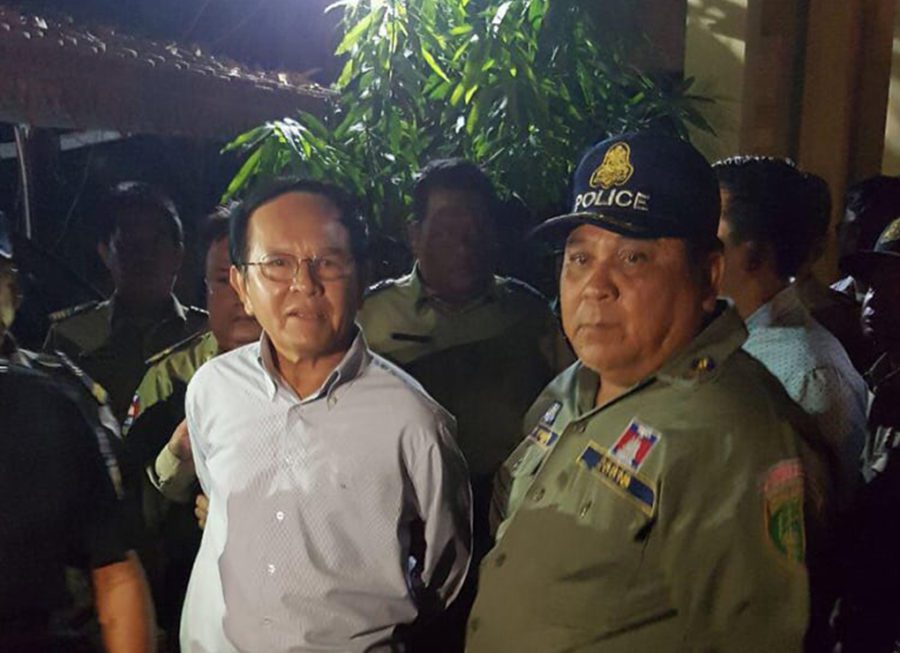Two international human rights organizations have condemned the legal procedures used in the continued detention of opposition leader Kem Sokha, who has now been deprived of his freedoms for more than 18 months without trial, saying he has been turned into a political hostage.
Phil Robertson, the deputy Asia director of Human Rights Watch, said Sokha’s detention had always been tied to political machinations since he was arrested in a midnight raid in September 2017 and sent to be jailed in the Trapaing Phlong prison in Tbong Khmum province. Sokha has since September 2018 been kept under house arrest in Phnom Penh.
Robertson said that Prime Minister Hun Sen used the court system to make an arrest of a prominent political opponent before last year’s elections and that the ruling party was worried about Sokha’s release now because it could lead to a movement for freedom and democracy in Cambodia.
“Now the Cambodian government claims that the investigating judge is still working on the case of Kem Sokha and the government uses this to justify continuing the rights abusing, highly restrictive house arrest which bars Sokha from seeing or talking to many of his friends and colleagues, and foreigners of any sort,” Robertson said in an email.
“What Sokha really is now is a hostage of the Cambodian government. He is being held under house arrest as an example to intimidate other opposition politicians and activists who are still in Cambodia,” he said. “Hun Sen is clearly worried that if Kem Sokha was free to start re-organizing his political party, the movement for rights and democracy in Cambodia would rapidly assemble behind him.”
Frederick Rawski, the Asia Pacific Regional director of the International Commission of Jurists, said that even though Sokha has technically been bailed, the terms of his quasi-legal house arrest meant the opposition leader lost his freedom and cannot exercise his political rights.
Putting Sokha under such “judicial supervision” amid a long-running investigation affected his rights to get a speedy and fair trial, he added.
“Kem Sokha was granted bail more than one year after he was arrested in 2017. And the bail conditions under which he was eventually released effectively put him under house arrest. It remains unclear when his trial will be held, and there is no guarantee that he will be granted a fair hearing when his case does go to trial,” Rawski said in an email.
“The right to fair trial entails the right to be tried without undue delay, and to have your case heard in a fair and public manner by a competent, independent and impartial tribunal. These rights have not been respected in Kem Sokha’s case. His lengthy pre-trial detention—which was extended despite his ill-health and requests for medical assistance—is also not necessary or proportionate and amounts to an arbitrary detention.”
Cambodia People’s Party spokesman Sok Eysan rejected the claims made by the two human rights organizations, maintaining that the government had no influence upon the court, which is an independent body.
“It is normal that the government has been blamed,” Eysan said, rejecting the claims. “We have not used the court as a tool to put pressure on the opposition. It completely depends on the court procedures.”
Justice Ministry spokesman Chin Malin explained that according to Cambodian law, an investigative judge could spend as much time as they needed on a case depending on the necessities and the complexities of each specific case, even though the courts always attempt to be as fast as possible.
“In general, the international principles want to have a fast [process],” Malin said. “In principle, it is like that, but in actual practice, there needs to be enough basic information [to allow for a proper hearing]. If it goes fast without enough basic information, that will affect the fair trial too.”
Phan Chansak, a lawyer for Sokha, declined to say what the opposition leader’s next legal plans were, citing the fact the investigative process of this case has already taken 18 months.
“For this point, I cannot give any comment to media because we are thinking about it. We cannot make any comment because we stay quiet at this stage. Lawyers cannot make any comment,” Chansak said.
Police arrested Sokha in September 2017 after the government accused him of colluding with the U.S. to illegally overthrow Hun Sen.












